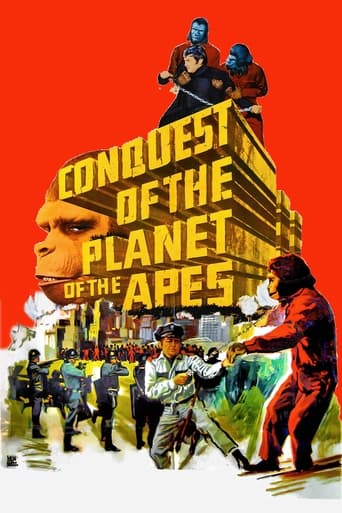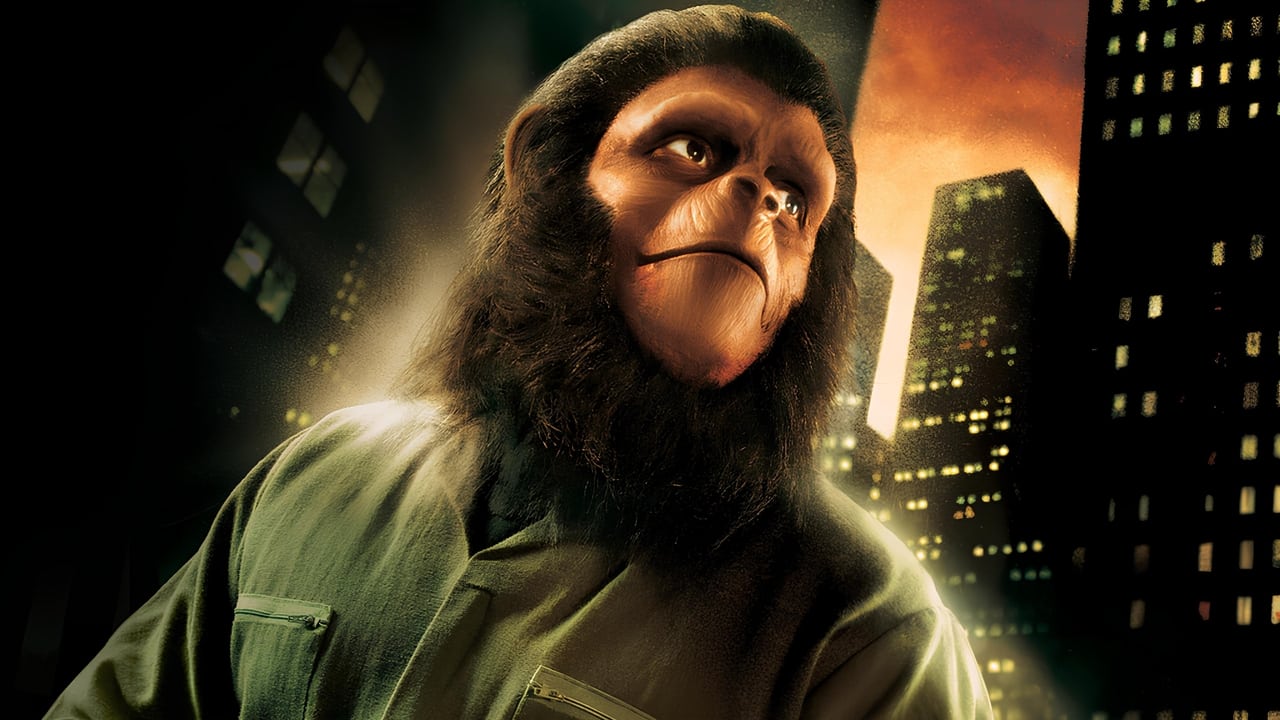Sparse
In the near-future (from where we left off), Simian Kind has been enslaved. The evolved ape son of Cornelius and Zira leads a revolution against mankind to emancipate the apes. Conquest of the Planet of the Apes (the "of" should probably be a "for", now that I think of it) is definitely among the better Apes films. Even with various declines in production value, budget, and writing, this entry still maintains enough intelligence to be considered among the "good" apes installments. Also, watching humanity getting their ass handed to them is damn entertaining. I'll often watch this film for that satisfaction alone."Conquest" was directed by J. Lee Thompson, who went on to direct the fifth and final entry in the franchise. Despite liking this movie overall, I'm not completely sold on Thompson's direction (foreshadowing, perhaps). Throughout the movie, there are various elements that felt sloppy. For example, there's a jarring cut at the very beginning, from a montage with a full musical score to a scene devoid of music at all-- without bothering so much as to edit the music to fade out/reverberate. There's also some bad ADR, and a handful of those awkward 70's zoom-ins, but otherwise the cinematography is fine. The photography of the city for example really drives in a tone for the film, surrounding the viewer with concrete in virtually every direction. The director also makes a point out of using lots of megaphones and intercoms, making this future feel authoritarian and immobile (both physically and in their dogmatism).There is however one really potent piece of direction from Thompson, and that is the revolution itself. The scenes of revolt were actually modeled after footage of race riots during civil rights movement, bringing a kind of violent, unnerving reality to this film and a racially charged undercurrent. This film can actually disturb you at times, and it's the film's greatest redeeming quality. I should also credit this film with being the second-most re-watchable Apes movie (the first being "Rise", go figure!), which could be attributed to its fast pacing/short runtime. Paul Dehn is the writer for the third film in a row, and provides a serviceable amount of intelligence overall despite struggling to keep his act together on smaller details. For example, there are a few basic premises the film presents that are hard to suspend disbelief for. Like the virus that wiped out dogs and cats, the awkward, forced romance between Caesar and Natalie Trundy's Lisa, or how Caesar was unaware of enslaved apes until he got to the city. I mean, it's pretty convenient that Caesar has been shielded from the reality of enslaved-apes for his entire life thus far. That way we can put in extra exposition for the viewer! Small things like just talking about the circus rather than showing it are also a problem. Showing it would have provided a better insight into Caesar's reality and given more emotional weight between him and Armando. I can also see however how that could have come off as silly, and it's evident that the budget was dwindling.In the long run, you really have to give this film credit for providing a solid foundation for the stellar reboot trilogy about Caesar. Even if Caesar's complexity isn't fully harnessed in this film, it implied a very layered character that would eventually be done justice. Caesar at his best is a character study on perspective, duality, and internal conflict, and there is definitely a presentation of those traits in "Conquest", albeit in a limited form. Also an impressive character is MaCdonald, who is not only likable but complex. There's a part of the movie where he talks about being a descendant of slaves, and this is where the franchises race allegory looks itself in the face. This kind of philosophy will actually help shape the duality within Caesar.Though the character of Caesar is more complex than Cornelius, this is arguably McDowall's lesser portrayal. He doesn't grasp the full extent of Caesars internal isolation, conflict, and introspection, though he does a good job of reflecting Caesar's anger. Ricardo Montalban as Armando is at times shaky, and there are times when it sounds like he's reading the script for the first time. That being said, he remains charming in his role. Hari Rhodes is stellar as MacDonald, and Don Murray does a fine job as Breck. Natalie Trundy as Lisa is clearly uncomfortable in the ape prosthetics, and is pretty bad, as are many of the ape extras (who inversely seem to be overacting).I like the costume design quite a bit, since it foreshadows the segregation within the apes' own society. It's a little more minimalistic than the outstanding costume design from the first film, but it complements the industrialistic setting well. The makeup here is not at it's best, but better than at its worst (that works for the whole movie, actually). The dreadful pullover masks from "Beneath" are thankfully gone. There are still lazier ape prosthetics/masks used for the extras when compared to the first film, but there's actually effort put in this time to make sure their eyes aren't caved in and hollow. Without a serviceable budget, it's inevitable that Chamber's makeup would diminish in quality.The musical score by Tom Scott is actually pretty good. It thrives with a satisfyingly eccentric melodicism, making it a worthy gesture in the footsteps of Jerry Goldsmith. Despite an often fickle presentation, "Conquest" manages to ride on a handful of strong merits that retain a level of intelligence in the franchise. I may like this film more than most, seeing as how I'm a nihilistic, iconoclastic maniac who finds the downfall of humanity highly satisfying (there might have been a less-scary way to put that), but the film has merits that can be appreciated by anyone nonetheless.Score: 7.5/10
joshuadrake-39480
Based on the strong positive response to Escape from the Planet of the Apes, Fox ordered Conquest of the Planet of the Apes, though it provided a comparatively low budget of $1.7 million. Paul Dehn returned as the scriptwriters and the producers hired J. Lee Thompson to direct.Thompson had worked with Jacobs during the planning stages of the first film, but scheduling conflicts had made him unavailable to participate in the series. For this film, Thompson and Dehn focused heavily on the racial associated the apes with African-Americans and modeled the plot after the 1966 Watts Riots and other episodes from the Civil Rights Movement.Following the events of the third film, this film is set in a near future where humans have turned apes into slaves, Caesar rises from bondage to lead an ape rebellion.The story is amazing and confusing as well, but I like it because it is like that. The action is over-the-top, but it works and is really fantastic. The music is really good as well and the other films musical scores' were amazing, well, with exception of "Beneath the Planet of the Apes".The acting is just amazing and dreadful at the same time. Roddy McDowall plays Caesar again, the son of his previous character Cornelieus.The late Ricardo Montalban returned as Armando and he does a good job as well. The new members including Don Murray, Severn Darden and Hari Rhodes playing new roles and they are really amazing in this film and the acting could have never been better.The music in the film is just stupid, but a few themes are amazingly well done and the make-up / visuals are really good and fantastic.Overall, CONQUEST OF THE PLANET of the APES is a little confusing, but spectacular in a few areas and I give this film a 6/10.
DKosty123
This movie is really FOX making the film on the cheap. Special Effects not needed and it relies on script. Sets are plain and a lot of night shooting means no cost for location shooting or back drops.The script of this is in some ways much better than I expected though there are some time wasting sequences of ape mobs and humans running around with pointless shooting and some humans wringing their hands about the Apes taking over.The progressive Liberal Slant is in big evidence as the film is set in 1991 and according to the humans in the film, humans only torture apes, not humans. Considering the sad reality we have seen since 9/11, this is idealistic to say the least. We have had humans beheaded, water boarded, and beyond by humans in the 21st Century already. What is more bothersome is the final nuke war this series predicts still could happen as these children in Israel and Palestine, Iraq and Iran throwing missiles at each other prove in abundance - yes the future could be destruction. Especially with the children who are trying to claim man can fix the earth's environment without really knowing if their cure might so more harm than what they are trying to fix.We have humans who have decided money and their beliefs are more valuable than human lives. Isn't that amazing?I am glad Roddy McDowell got to do some acting and script and this movie does play better than I expected. Ricardo Montoban is another plus. One thing makes perfect sense in this script. Because Zira, the peace loving chimp was killed in the last film, the Apes decide the only way to escape being human slaves is by power.Another Irony of the Sci-Fi here is the virus killing off all the dogs and cats and human pets. In real life, humans have decided by preserving wet land areas and deer whose ticks cause Lyme Disease, the humans are getting closer to killing of themselves instead of the pets dying. The wet lands are spreading more human disease than ever.Then there is human madness, which is booming for a reason. As these companies have decided to save energy by using Mercury in light bulbs, has brought back the kind of human madness that existed in past history. It is Mecury Poisoning that created the term "mad as a hatter". Considering the way Corporations are after profits, and from the way human behavior has changed since these light bulbs came out, maybe we are all mad.A world where Apes evolve from man and humans do not torture humans? There has got to be an answer.
tieman64
In 1961, writer Rod Sterling was asked "what he'd most like to write about next?" He responded: "I'd like to do a definitive study of segregation, from the Negro's point of view." Several years later Sterling would write "Planet of the Apes", soon turned into a 1968 film by Franklin Schaffner. A giant "what if the shoe were on the other foot?" parable, the film finds a chauvinistic American astronaut (Charlton Heston) stranded on a planet ruled by apes. Here he's forced to experience racial discrimination of a type once reserved for blacks.Much of "Planet of the Apes" consisted of a hierarchical society of monkeys, apes and gorillas enslaving and persecuting white humans, actions which they justify along bio-genetic lines. Ironically, though it was intended to show support for African Americans, "Planet" came under attack from activists and black leaders. The film, some argued, re-inscribed racial conflict as species conflict (black/monkey vs white/human), and hinged on physical difference as the point of struggle. The film also played into issues of skin-colour hierarchy, making lighter apes more intelligent than their darker, more uncivilised counterparts. Others would argue that the film endorsed various racist "interpretations" of biological evolution; the belief that Africans are "closer to animal than man", and that primates occupy the border zones between mythic poles. In this view, apes and Africans are liminal creatures, simultaneously like and unlike human beings, located between nature and civilisation, origin and destination. These contradictions have led to the film being labelled either well-meaning or reactionary, pandering to white fears of black uprisings and loss of racial dominance. This, after all, was a period of time in which some believed that black liberation struggles would threaten the security of white racial hegemony.Regardless, Charlton Heston is fittingly cast as our "white hero". Heston made a career starring in epics in which Western and non-Western interests collide. In "Gunfighter Nation: The myth of the frontier in 20th century America", for example, cultural historian Richard Slotkin states that the typical Heston character was a "hard and self-willed White male hero", an ultra conservative "who stands for the highest values of civilisation and progress but who is typically besieged from without by non-white savages who greatly outnumber him and beset from within by the decadence, corruption and softness of his own society". Indeed, in the sixties Heston seemed to be perpetually fighting to defend an outpost on the margins of Western civilisation from barbaric onslaughts (The Naked Jungle, El City, 55 Days at Peking, Khartoum etc)."Planet of the Apes" was brilliantly directed by Franklin J. Schaffner, who treats us to some wonderful widescreen photography and a couple fine action sequences. Its sequel was "Beneath the Planet of the Apes", directed by Ted Post. Filled with apocalyptic imagery (lots of radiation, nuclear war, disease), the film portrayed its society of apes, the winners in a war between monkey and man, as having become as classist, racist, warmongering and destructive as white humans. Rod Sterling's metaphors are henceforth complicated; both the white man and ape at different points of the franchise's time-line represent both white hegemony and persecuted blacks. Apes, we then learn, were once slaves to humans, just as humans are now slaves to apes. The first two films in the franchise also hinge on a big secret: the ape society is covering up the fact that human civilisation existed before ape civilisations and that apes are "descended" from humans. The implication, depending how literally you regard the film's dubious ape/minority metaphors and reversals, is that whites shamefully regard themselves as having "evolved" from blacks.The next film in the franchise, "Escape from the Planet of the Apes" sees a group of intellectual apes travelling back in time. They arrive on Earth, where they are abused by a paranoid military industrial complex which kills them all, except for one ape child, Caesar.J. Lee Thompson's "Conquest of the Planet of the Apes" followed. The best sequel in the franchise, the film sees a now adult Caesar leading a revolution (based on the Watts race riots) against a humanity which is attempting to turn apes into slaves. Significantly, Caesar's army of apes learns to talk. Their first word is "no", a command which refers to the apes' abhorrence of weapons and violence. Next came "Battle for the Planet of the Apes", again directed by Thompson. Here, within a post-nuclear society, an ageing Caesar struggles to combat ape factions which want to wipe out all of humanity. Caesar, in contrast, fights for peaceful coexistence. Caesar wins, leading to a long period of peace between man and monkey.So each ape film film is built around the conflict between a racially dominant oppressive group and a racially subordinate oppressed group seeking survival, harmony or reversal of domination. Each film also presents mediating figures – typically marginalised and at odds with the oppressing group - who intervene in the conflict, challenge systems and act as advocates of harmony. The advocates of peace rarely prevail and hostility always results in apocalyptic violence.The ape franchise would be rebooted in 2011 with "Rise of the Planet of the Apes". A post-racial film, "Rise's" cast is filled with a cocktail of African Americans, whites and Indo-Americans. For the first time in the franchise, metaphor is replaced by literalism. Here, "literal apes" are "literally rebelling" against the "literal animal cruelty" (chemical testing) directed against them by "literal scientists". Typically (mis?)read in light of post-financial crisis protests, the film ends with apes, led by Caesar, escaping their cages for the trees of local forests. Here, segregation is "in everyone's best interest" and Caesar concludes that separation is "natural". The apes, now free, have returned to their correct, natural and separate place. For now.8/10 - Worth two viewings.



 AD
AD





